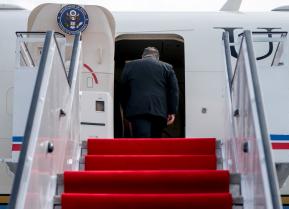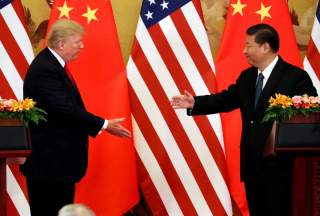America and China: Destined for Conflict or Cooperation? We Asked 14 of the World's Most Renowned Experts
The National Interest asked 13 scholars and experts to respond to the following question: Given growing tensions between the United States and China, where do you see the overall relationship headed? Towards a permanent state of competition?
The National Interest asked 13 scholars and experts to respond to the following question:
Given growing tensions between the United States and China, where do you see the overall relationship headed? Towards a permanent state of competition? Potential conflict? Or an eventual restoration of a more friendly and cooperative relationship?
From the diverse array of experts we assembled, we received responses from across the spectrum. Some think military conflict is inevitable. Some think there is no reason the two sides should not be able to keep peace. Some see China as a status quo power. Others see China as a revolutionary challenger.
The following is each response in alphabetical order. (The views of authors expressed are their own and not necessarily those of their institution.) Click on the links below to go to each expert's response.
Graham Allison (see below), Gordon G. Chang, David Denoon, Michael Fabey, John Glaser, James Holmes, Lin Gang, Kishore Mahbubani, Robert Ross, Ruan Zongze, Robert Sutter, Xie Tao, Xu Feibiao and Wang Jisi.
Graham Allison, Author of 9 Books, most recently Destined for War: Can America and China Escape Thucydides's Trap?. He is presently the Douglas Dillon Professor of Government at the Harvard Kennedy School:
Relations between the U.S. and China are destined to get worse before they get worse.
The underlying reason is Thucydides’s Trap. When a rising power threatens to displace a ruling power, alarm bells should sound: extreme danger ahead. Thucydides explained this dangerous dynamic in the case of Athens’s rise to rival Sparta in classical Greece. In the centuries since then, this storyline has been repeated over and over. The last 500 years saw sixteen cases in which a rising power threatened to displace a major ruling power. Twelve ended in war.
Unless Xi Jinping fails in his ambitions to ‘Make China Great Again,’ China will continue challenging America’s accustomed position at the top of every pecking order. If Xi succeeds, China will displace the U.S. as the predominant power in East Asia in his lifetime. Unless the U.S. redefines itself to settle for something less than ‘Number 1,’ Americans will increasingly find China’s rise discombobulating.
As Thucydides explained, the objective reality of a rising power’s impact on a ruling power is bad enough. But in the real world, these objective facts are perceived subjectively — magnifying misperceptions and multiplying miscalculations. When one competitor ‘knows’ what the other’s ‘real motive’ is, every action is interpreted in ways that confirm that bias.
Under such conditions, the competitors become hostage to third party provocations, or even accidents. An event as bizarre and otherwise inconsequential as the assassination of an archduke in Sarajevo in June 1914 forces one or the other principal protagonists to respond. In doing so, it triggers a spiral of actions and reactions that drag both to an outcome neither wanted. Candidates for that role in the current rivalry include not only Kim Jung-un but political trend lines in a democratic Taiwan, whose citizens have less and less interest in living in China’s Party-driven autocracy.
Having been engaged in intense discussions with many of the leaders of both China and the U.S. over the past 14 months since publication of my book, Destined for War: Can America and China Escape Thucydides’s Trap?, my takeaway is that if Thucydides were watching, he would say both parties are entirely on script, accelerating towards a collision that would be as catastrophic as it is unintended.
Escaping Thucydides’s Trap in this case will require a surge of strategic imagination as far beyond the current conventional wisdom in DC and Beijing as the remarkable Cold War strategy crafted by statesmen we now celebrate as the ‘wise men’ was beyond the consensus in Washington at the end of World War II.
Check out other comments in this series from: Graham Allison, Gordon G. Chang, David Denoon, Michael Fabey, John Glaser, James Holmes, Lin Gang, Kishore Mahbubani, Robert Ross, Ruan Zongze, Robert Sutter, Xie Tao, Xu Feibiao and Wang Jisi.
Gordon G. Chang, Columnist and author of The Coming Collapse of China:
The United States of America and the People’s Republic of China have irreconcilable interests. As a result, these two super states are destined for intense competition and perhaps conflict.
We call China “revisionist,” but “revolutionary” is more precise. Chinese state media outlets these days, like in the 1950s and 1960s, carry revolutionary statements. China’s media now fawn over Xi Jinping’s “unique views on the future development of mankind.”
What is so unique about the views of the regime’s supremo? In September 2017, Foreign Minister Wang Yi, in Study Times, the Central Party School newspaper, wrote that Xi’s “thought on diplomacy” has “made innovations on and transcended the traditional Western theories of international relations for the past 300 years.”
Wang’s 300-year reference was almost certainly to the Treaty of Westphalia of 1648, now recognized as the basis of the current international system of sovereign nations. Wang’s use of “transcended” indicates Xi is contemplating a world without states other than China, especially because Xi himself often uses language of the imperial era, when Chinese emperors maintained that they—and they alone—ruled tianxia or “all under heaven.”
This tianxia worldview, increasingly evident in Xi’s and Beijing’s pronouncements, is, of course, fundamentally inconsistent with the existence of a multitude of sovereign states. The Chinese view, breathtakingly ambitious, unfortunately drives many of Beijing’s belligerent actions.
Beijing leaders not only speak tianxia but act tianxia. They are, for instance, trying to take territory from India in the south to South Korea in the north. At the same time, they are moving to close off international water and airspace, a direct challenge to everyone not Chinese. They are supporting the North Korean nuclear weapons and ballistic missile efforts with technology, components, equipment, materials, and financial and diplomatic support. Almost every day, their media attack the concepts of representative governance and individual freedom.
China’s rulers act with impunity, injuring American pilots and diplomats and harassing American ships and aircraft. They have seized an American vessel from international water and interfered with others. They steal hundreds of billions of dollars of American intellectual property each year. They ignore their obligations to other states while expecting other states to honor theirs to China. They are engaging in nothing less than an assault on the world’s rules-based order.
For about 150 years, American policymakers have drawn their western defense perimeter off the coast of Asia. China each day seeks to undermine America’s friends and allies in East Asia and drive the U.S. away. That effort, of course, directly undermines American security.
China’s challenge to America is across the board and therefore existential.
Check out other comments in this series from: Graham Allison, Gordon G. Chang, David Denoon, Michael Fabey, John Glaser, James Holmes, Lin Gang, Kishore Mahbubani, Robert Ross, Ruan Zongze, Robert Sutter, Xie Tao, Xu Feibiao and Wang Jisi.
David Denoon, Professor of Politics and Economics at NYU’s Department of Politics and editor of China, The United States, and the Future of Southeast Asia:
Background:
The current downturn in U.S.-China relations began in 2007. The George W. Bush administration was so preoccupied with Iraq, and the Middle East more generally, plus its frustrations with the Six Party Talks on North Korea, that it failed to respond adequately as China became more assertive in the 2007-08 period.
In that period the Chinese government recognized that it could exert pressure on its neighbors without producing a sharp response from Washington. The initial signs of Chinese aggressiveness were in harassment of the Japanese over territorial claims in the East China Sea and the Senkaku/Diaoyu Islands.
The Obama administration began its Asia policy with a flourish, announcing the ‘Pivot to Asia’ and a ‘Rebalancing,’ implying a greater military and economic commitment to Asia than had been given by Bush. Although the ideas underlying the rebalancing were admirable, the follow-up was unimpressive.
Then a downward spiral began as the Obama administration proved indecisive. A weak response to the Arab Spring, vacillation over Libya, and the failure to respond when the Syrian government used chemical weapons against its own population all contributed to a sense of weakness in Washington. The Chinese used the moment to press ahead with a more assertive policy in the South China Sea. Also, by 2009, the seriousness of the financial crisis in the United States was being understood, and it led many Chinese to conclude that the U.S. style of economic management was undercutting American strength. Thus, the combination of a flaccid foreign policy and economic turmoil created an ideal situation for the Chinese to be assertive.
Shortly thereafter, the Chinese proceeded with the occupation and militarization of seven atolls in the South China Sea and ignored the ruling against this occupation by the International Tribunal of the Law of the Sea. This also led to a split among the Southeast Asian states with Myanmar, Thailand, Laos and Cambodia essentially aligning with China. Subsequently the Philippines began its current game of trying to keep its treaty with the U.S. while trying to extract more aid and trade from China. The Chinese also launched a series of new institutions and programs (The Asian Infrastructure Investment Bank, the New Development Bank, the Silk Road Fund, and the Belt and Road Initiative) designed to link their economy with their neighbors.


